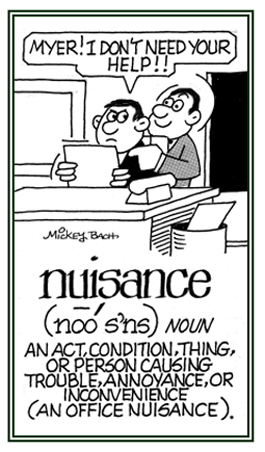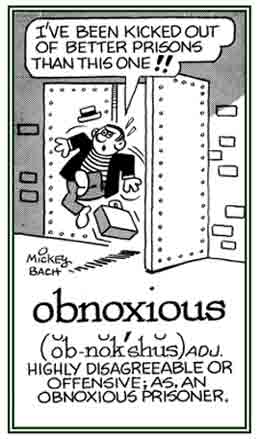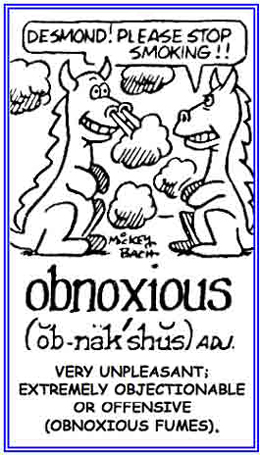nox-, noxi-, noc-, nui-, nec-
(Latin: harmful, to do harm; injury, injurious; hurt, damage)
2. Anything which is offensive or noxious: John's wife was complaining that the noise from the electric fan was a real nuisance!
Too often, weather forecasts presented on TV, or the radio, become nuisances because they are wrong.
3. An annoying or irritating person, practice, or thing: The excessively talkative student was a nuisance for the teacher and the rest of the class.Ted considered all of the e-mails that he receives on his computer from unknown sources nothing more than nuisances; especially, those that claim he has become the beneficiary of thousands or millions of dollars!
4. Etymology: "injury, hurt, harm," from Anglo-French nusaunce, from Old French nuisance, from nuire, "to harm"; from Latin nocere, "to hurt".The sense has softened over time, to "anything obnoxious to a community" (bad smells, pests, eyesores), in about 1661, then it became a "source of annoyance, something personally disagreeable"; from about 1831. The application to people was from about 1695.

Go to this Word A Day Revisited Index
so you can see more of Mickey Bach's cartoons.
2. Annoying or objectionable due to being a showoff or attracting undue attention to oneself: Brian's little boy was an obnoxious little brat.
3. Etymology: from Latin obnoxius, "exposed to harm" was the original meaning of obnoxious in English, in the sixteenth century.
The current meaning dates from the seventeenth century, and came to develop its sense because of its association with noxious so that for a time it actually meant "harmful", as noxious does.


Go to this Word A Day Revisited Index
so you can see more of Mickey Bach's cartoons.
"Whatever people in general do not understand, they are always prepared to dislike; the incomprehensible is always the obnoxious."
2. Odiousness; offensiveness: "The obnoxiousness of the law rendered the federal legislature unpopular."
3. Characterized by being very unpleasant or rude.
2. Denoting people or situations that elicit fear, pain, anxiety, or anger in an individual.
Cross references of word families that are related directly, or indirectly, to: "wound, harm, hurt, injure": noci-; traumat-; vulner-.

